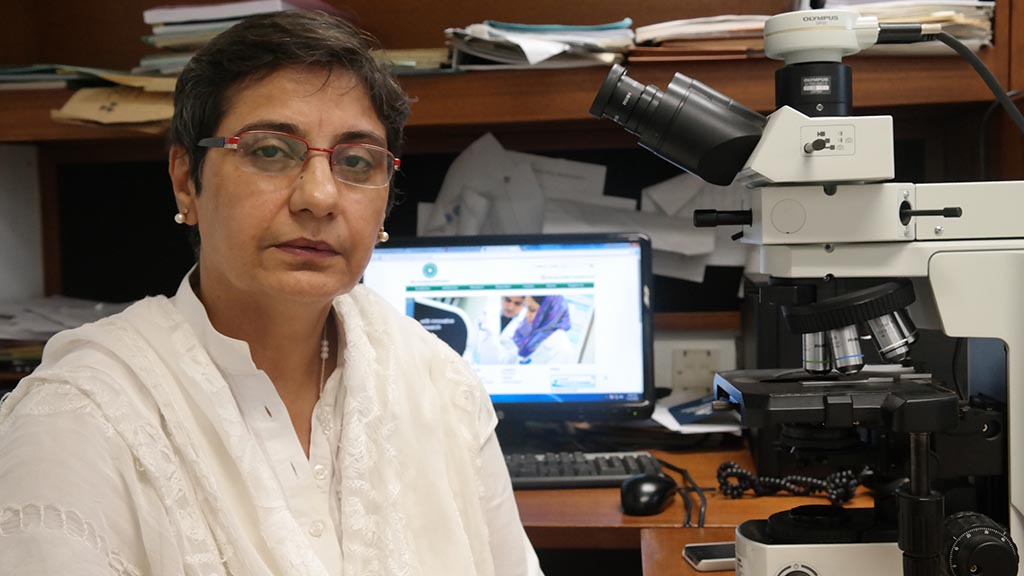IN CONVERSATION WITH

Chairperson,
Aga Khan Health Service, Pakistan
eHealth is gaining more and more traction around the world. Do you think this is also the case in Pakistan? What do we need to focus on to increase the adoption of eHealth?
The state of eHealth in Pakistan is not at par with that of other countries around the world. We still have some catching up to do. However, the potential for eHealth here is immense. We have the opportunity to leverage the power of Information and Communication Technologies (ICT) and focus our eHealth efforts on remote areas where communities have difficulty accessing quality health care. eHealth is the future of medicine for increasing access of the remote communities to cost effective quality health care.
Health care providers serving that population cannot be relieved of their duties to travel to attend continuing education trainings. Traveling is time consuming and resource intensive, especially given limited resources. Therefore, the trainings must be taken to them. We must focus on providing professional development services to our health care providers; make sure they are equipped with the knowledge, tools and resources needed to effectively carry out eHealth activities. It is important that we instill in them a sense of ownership and develop them into strong eHealth advocates.
What do you want readers to understand about the importance of eHealth in providing access to health care, especially in Pakistan?
The importance of eHealth in providing quick access to high-quality health care cannot and should not be undermined or underestimated. For a country like Pakistan, the role of eHealth becomes even more important. Let's consider the communities we focus on in northern Pakistan. People from these communities have to travel days on end to avail specialist health care services. They have to spend money they can't afford to spend. They invest in time that they may not have, given the severity of their condition.
Through eHealth, we remotely connect them to a specialist at a higher level facility be it Gilgit Medical Centre or the Aga Khan University Hospital in Karachi. Through this technology, barriers of distance, cost and time will be eliminated. eHealth provides access to cost-effective quality care at the doorsteps of patients living in difficult terrains.
What are your hopes for the AKDN eHealth Programme within Pakistan? How do you envision it expanding over the next 5-10 years?
We have just started. I hope that the Programme expands exponentially over the next few years. The AKDN eHealth Programme has progressed well in 2014. We initiated live teleconsultations in Psychiatry between Gilgit Medical Centre and the Aga Khan University Hospital, Karachi and later between Aga Khan Booni Medical Centre and the Aga Khan University Hospital, Karachi.
In the months and years to come, I envision that all the remote and difficult areas served by AKDN agencies will have robust eHealth connections and facilities. I hope that we can expand our network and coverage to include a greater number of cities and communities that can benefit from eHealth.
What challenges can be expected in the implementation and adoption of eHealth services as we continue to expand in the country?
First of all, I feel technical issues such as reliable connectivity may pose a challenge when establishing and implementing eHealth services. However, with rapid technological advancements, I believe this challenge will be overcome. Secondly, the availability of willing quality faculty/ physicians in terms of time and capacity will remain a challenge in times to come.
However, with a great resource like the AKDN eHRC, these challenges should not be difficult to overcome. The online certificate courses developed by AKDN eHRC will be a great resource for building the capacity of our health care professionals, enabling them to effectively provide quality eHealth services. Additionally, AKDN eHRC is assisting with live broadcasting continuing medical education sessions to health care professionals, further contributing to increased capacity building of our health care providers.
How do you envision the AKHS, P - AKDN eHRC collaboration developing over the years? In what areas do you particularly see AKDN eHRC playing a critical role?
I see this relationship growing exponentially in times to come. AKDN eHRC will be playing a major role in the provision of cost-effective health care services to the communities we serve. This will require consultations and referrals to health care facilities situated closer to where the communities live. It will also require upgrading and strengthening the skills and knowledge of health care providers working in remote areas that are located in difficult terrains.
AKDN eHRC is uniquely positioned to provide these services through its expertise and experience in ICT. The AKHS, P - AKDN eHRC collaboration therefore is important and critical, one that will ensure the delivery of an expanded eHealth network within Pakistan in the years to come.
Back To Top
